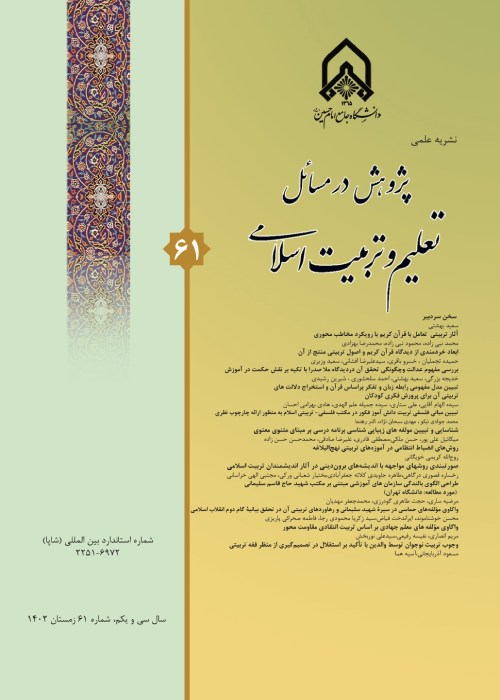Explaining the Objectives of Islamic Training for Adolescents through Responsibility Approach
Author(s):
Article Type:
Research/Original Article (دارای رتبه معتبر)
Abstract:
Recognition of one’s objectives is a basic need of human beings for knowing the right path and taking the right way to get trained and feel responsibility. This is because there is always the possibility to get away from the right way without knowing the objectives. Therefore, the first provision for coordinating educational activities is to have an aim to guide the related programs and activities. It is therefore essential that program designer specify the aims of training. The main purpose of training in all schools is the perfection of man, and all his activities are influenced by it. This study is aimed at formulating the goals of Islamic education for adolescents with emphasis on the responsibility approach. It is an applied research in terms of purpose, which follows qualitative content analysis. The statistical population contains the Holy Qur'an and the related saying (including source books on hadith and narration). In the first phase, the required data were derived from reviewing Islamic literature. The data were then analyzed in three stages of open, axial and selective coding, followed by categorization, integration, and refinement. The main category was determined as the objectives of Islamic training focusing on taking responsibility. The findings indicated that the most essential goals of Islamic education focusing on taking responsibility are: religious beliefs including worship and serving Unique God (performing rituals, piety, gratitude), economic goals including work and living morals, cultural goals including self-reliance, participation in group activities, safeguarding purity and family relationships, co-operation, encouraging of good deeds and prohibiting evil deeds as his public duties, fostering discipline, scientific, and instructive aims including enhancing rationality, investigation and thinking, nurturing the spirit of continuous education, nurturing a spirit of participation and collaboration in group activities, and fostering a spirit of reading and studying.
Keywords:
Language:
Persian
Published:
Scientific Journal of Islamic Education, Volume:27 Issue: 45, 2020
Pages:
171 to 196
https://magiran.com/p2111335
دانلود و مطالعه متن این مقاله با یکی از روشهای زیر امکان پذیر است:
اشتراک شخصی
با عضویت و پرداخت آنلاین حق اشتراک یکساله به مبلغ 1,390,000ريال میتوانید 70 عنوان مطلب دانلود کنید!
اشتراک سازمانی
به کتابخانه دانشگاه یا محل کار خود پیشنهاد کنید تا اشتراک سازمانی این پایگاه را برای دسترسی نامحدود همه کاربران به متن مطالب تهیه نمایند!
توجه!
- حق عضویت دریافتی صرف حمایت از نشریات عضو و نگهداری، تکمیل و توسعه مگیران میشود.
- پرداخت حق اشتراک و دانلود مقالات اجازه بازنشر آن در سایر رسانههای چاپی و دیجیتال را به کاربر نمیدهد.
In order to view content subscription is required
Personal subscription
Subscribe magiran.com for 70 € euros via PayPal and download 70 articles during a year.
Organization subscription
Please contact us to subscribe your university or library for unlimited access!


